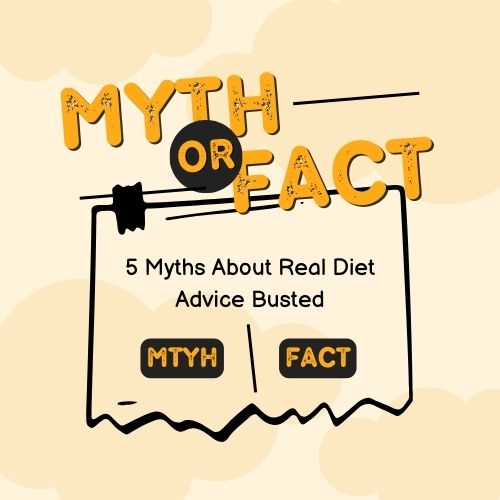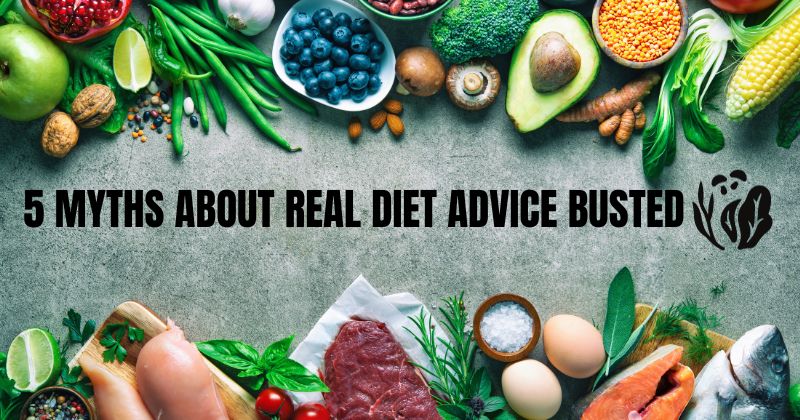Welcome back to another eye-opening exposé. Are you tired of seeing misinformation dominate your social media feeds and health magazines? Well, it’s high time someone shed some light on this jungle of misleading advice. Today, we’re diving into “5 Myths About Real Diet Advice Busted.” Yes, you heard it right—no more accepting things at face value. We’re here to put on our Sherlock hats and solve this dietary mystery. Grab your magnifying glasses and notebooks because this is an investigative journey you won’t want to miss. Think of this article as your nutrition GPS, guiding you away from Dead-End Diets and toward the Highway of Health. Trust me, by the end of this read, you’ll become the go-to myth-buster in your friend circle. So, without further ado, shall we unravel these mysteries? Ready? Let’s get started!
5 Myths About Real Diet Advice Busted
Before we get into the nitty-gritty, it’s essential to understand that some widely accepted “health tips” are just myths wrapped up in fancy wording. Now, you may wonder, how did these myths become so popular in the first place? Well, often they’re rooted in a grain of truth, twisted and amplified by marketing schemes or good old-fashioned hearsay. We live in an age where misinformation can spread faster than a California wildfire, creating a web of confusion when it comes to what’s genuinely healthy and what’s not. And hey, let’s not forget the power of compelling storytelling; a dramatic “before and after” tale can make almost any diet myth seem legit. So, let’s debunk some of these fallacies, shall we?

Myth 1: “Low-Fat” Means “Healthy”
The Actual Reality
Did you know that “low-fat” is often a smokescreen? You might be gulping down sugar in disguise. The moment fat is removed from a product, it often loses taste. To compensate, manufacturers add sugars or artificial sweeteners. So next time you reach for a “low-fat” snack, remember you might just be trading one dietary villain for another!
- Examples: Low-fat yogurts, salad dressings
- What to Do: Read the nutritional labels and prioritize foods rich in healthy fats like Omega-3s.
Why it’s a Myth
- Misleading Labels
- Artificial Additives
- Reduced Nutritional Value
Myth 2: Detox Teas Can Help You Lose Weight Quickly
The Actual Reality
Ah, detox teas—the poster child for quick-fix solutions! But these teas often contain laxatives that cause water loss, not fat loss. In essence, you’re just dehydrating yourself temporarily and not achieving any real, sustainable weight loss.
- Examples: Teatox, FitTea
- What to Do: Opt for natural hydration options like water or herbal teas without additives.
Why it’s a Myth
- Temporary Water Loss
- May Contain Harmful Substances
- Doesn’t Address Root Cause
Myth 3: Gluten-Free is the Way to Be!
The Actual Reality
Unless you have celiac disease or a genuine gluten sensitivity, going gluten-free won’t make you healthier. Plus, gluten-free products often contain more sugar and fats to improve taste. So ironically, you could end up consuming more calories and less nutrition by hopping on the gluten-free bandwagon without a medical reason!
- Examples: Gluten-free cookies, cakes
- What to Do: Again, read those labels and consult with a healthcare provider for personalized advice.
Why it’s a Myth
- High in Sugar and Fats
- Expensive
- Lacks Certain Nutrients
Myth 4: Supplements Can Replace Food
The Actual Reality
While supplements can complement a balanced diet, they can’t replace the nutritional complexity found in whole foods. In other words, that daily multivitamin is not an excuse to skip out on your fruits and veggies!
- Examples: Multivitamins, protein shakes
- What to Do: Prioritize nutrient-dense foods like fruits, vegetables, and whole grains.
Why it’s a Myth
- Lack of Fiber
- Artificial Additives
- Absorption Rates
Myth 5: Calories In, Calories Out is All That Matters
The Actual Reality
Although the principle holds some truth, not all calories are created equal. The type and timing of the calories you consume matter as well. For instance, 100 calories from a sugary soda can’t be equated with 100 calories from a protein-rich chicken breast in terms of overall health impact!
- Examples: Fast food vs. homemade meals
- What to Do: Opt for well-balanced meals that contain a variety of nutrients.
Why it’s a Myth
- Ignores Nutritional Content
- Doesn’t Account for Metabolic Rate
- Simplifies a Complex Process
FAQs
- How can I distinguish between myths and real diet advice?
Research and consult trusted sources. Websites of reputable health organizations and peer-reviewed scientific journals are good places to start. Consult a healthcare provider for personalized advice. They can offer insights that are tailored specifically to your health needs, which is something a generic online article can never do.
- Are organic foods always a better option?
Not necessarily. Organic does not mean nutrient-rich or low-calorie. It simply means the food was grown without certain synthetic pesticides or genetically modified organisms. You still have to read the labels for sugar, fat, and caloric content. After all, organic cookies are still cookies!
- Can I trust health advice from social media influencers?
Always fact-check and consult professionals for health-related matters. While some influencers may have helpful advice, they often aren’t certified nutritionists or healthcare providers. Remember, that detox tea they’re promoting might just be a paid sponsorship!
- Do fad diets ever work?
They may offer short-term results but usually fail to provide long-term solutions. When you follow a fad diet, you’re often restricting essential nutrients or consuming them in excessive amounts, which is not sustainable. Real diet advice emphasizes balance and variety, not exclusion and extremism.
- Why do diet myths persist?
Marketing strategies and public misconceptions often perpetuate diet myths. Think of it as a game of telephone but with your health on the line. One person misinterprets a study, then the media grabs it, and before you know it, everyone’s avoiding gluten like it’s the boogeyman. A healthy dose of skepticism can go a long way.
Key Takeaways
- Read the Labels: Nutrition facts and ingredients can unveil the truth behind claims.
- Consult Professionals: For personalized diet plans, always consult a healthcare provider.
- Myth-Busting is Empowering: Equip yourself with knowledge to make informed choices.
Conclusion
Ah, what a rollercoaster! We’ve just busted 5 Myths About Real Diet Advice and we’re all the wiser for it. Remember, not everything that glitters is gold, and not every health claim is backed by science. As we’ve learned today, the best approach to a balanced diet is through informed choices, not catchy marketing slogans or fad diets.
But hey, why stop here? Use what you’ve learned to spark some fascinating dinner table conversations. Trust me, Aunt Karen needs to know that detox teas are not the fountain of youth she thinks they are. As you champion these truths, you’ll not only be helping yourself but also creating a ripple effect that may help others question their own beliefs. After all, the first step to change is awareness. Let’s normalize making dietary choices based on facts, not fear.
As you go forth on your journey to optimal health, keep these myth-busting insights in your back pocket. They’ll help you navigate the winding road of nutritional advice with a confident stride. So go ahead, be the myth-buster in your circle and spread the word!
Recommended Post for You
- Real Diet Advice: Transformative Tips Beyond the Hype
- The Real Deal: Unveiling the Benefits of Real Diet Advice
- Real Diet Advice: Your Key to a Healthier Lifestyle
- Top 3 Misconceptions About Real Diet Advice – Debunked!
- Debunking Myths: The Real Facts About Real Diet Advice
- Is Real Diet Advice a Game-Changer? Truth Revealed!
- Boost Your Health with These 7 Real Diet Advice Tips
- Master Your Meals: Real Diet Advice for Meal Planning
- Why ‘Real Diet Advice’ Isn’t As Scary As You Think!
- Stop Guessing: Get the Real Diet Advice You Deserve
For Further Study
For those looking to dig deeper, the Academy of Nutrition and Dietetics offers excellent resources on evidence-based dietary advice.
Happy myth-busting!
